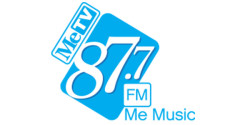Channel surfing on cable or over-the-air TV you may have come across Bewitched, Columbo or other “classic” re-runs on a station that calls itself MeTV. This successful Chicago-based upstart network that airs its nostalgic programming on digital television subchannels across the country is dipping its toes into the radio pool.
Today MeTV parent company Weigel Broadcasting is taking over Chicago’s LPTV channel 6, which is better known for its audio frequency that bumps into the far left of the FM dial at 87.7 FM. The station has been on a wildly shifting ride for the last six years, going from smooth jazz to alternative rock to a failed experiment as a Tribune-run sports talk station. A whole lot of time, energy and money has been invested in a station that isn’t even properly licensed for the FM dial–existing in a spectral loophole–and whose continued existence is now subject to an ongoing FCC rulemaking proceeding.
Using the new WRME-LP call letters, 87.7 MeTV FM plans to bring a nostalgia-heavy “Me Music” format to the Chicago airwaves, targeted at Baby Boomers. Weigel’s Neal Sabin, who is responsible for the new radio format, said, “87.7 MeTV FM will differ from the current ‘classic hits’ format by playing a much broader range of music skewing on the pop/softer side including singer/songwriters, album tracks and hits deemed ‘oldies’ by some programmers but considered gold by our target audience.” These artists include Carly Simon, James Taylor, Neil Diamond and ”Motown superstars."
According to media reporter Robert Feder, the station has no air talent or full-time programming staff, relying on a part-time freelancer to get things started.
Given the tenuous future of analog LPTV stations, it’s unclear what the strategy is for MeTV FM. Although the FCC is considering options for allowing channel 6 LPTV owners to continue as radio broadcasters in some fashion, it’s an option that incumbents, like NPR, take pains to oppose. The more likely scenario is that analog LPTV stations will have one or two years to transition to digital, turning off their analog signals that enter the FM dial through the back door. When the deadline for that transition looms, what happens to MeTV FM?
I’d have to guess that Weigel is leasing the signal for a song–so to speak–making the endeavor a relatively low-cost experiment. If MeTV FM finds an audience on this relatively weak signal, that could be fuel for growing the format onto legitimate FM stations.
Otherwise, going with old-fashioned analog FM for this experiment is a smart move. Although internet radio might at first seem like the quickest and most obvious route, the performance royalty and bandwidth costs could actually outpace that for leasing channel 6. Plus, Weigel is targeting an aging demographic that is less likely to use internet radio, and which it has already engaged though its pioneering use of underutilized digital TV sub channels. And, on top of that, the company can advertise its radio station on TV pretty much for free.
I will be curious to see if MeTV FM forges a lasting place on the Chicago FM dial or becomes just another passenger though the revolving back door of 87.7 FM. Since I’m no longer in Chicago I would appreciate if any readers in the station’s listening area would tune in and leave a comment with your impressions.



